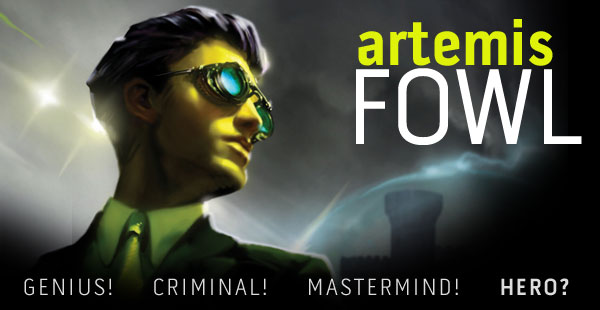I can’t pretend that Eoin Colfer’s Artemis Fowl books are really recent enough to warrant a review: they were published, one a year, starting in 2001. However, I had loads of free time this weekend, so I picked up the first novel in the series, Artemis Fowl, just to see if it was really as good as my seven-year-old self had thought.
Surprisingly enough, it was, and I ended up rereading the entire series in about a week.
The eight books tell the story of Artemis Fowl II, a boy genius from a wealthy Irish family with criminal tendencies, and Holly Short, an elf and the first female captain of the fairy LEPrecon.
In the first book, twelve-year-old Artemis has taken over the Fowl criminal empire following his father’s presumed death at the hands of the Russian Mafia. His research has led him to confirm the existence of an advanced fairy society, and he obtains and translates a copy of the fairies’ holy book. He then goes a step further and actually captures a fairy, Holly Short, holding her for ransom.
This establishes Artemis’ connection with the fairy People, which waxes and wanes through the rest of the series. He can be the People’s ally or their enemy, depending on the circumstances, and although he pilfers a great deal of their technology, he also uses his prodigious intellect to help them protect themselves from the human “Mud Men.”
Artemis also publishes academic papers in his spare time, under cleverly disguised pseudonyms such as Dr. C. Niall DeMencha or Sir E. Brum. He is full of sarcasm and wit, but his social awkwardness makes him less of a standoffish, aloof character and more of someone the reader can relate to.
The foil to Artemis’ sharp-edged tongue comes in the form of Butler, his aptly named bodyguard and assistant. Butler has the perpetually difficult job of making sure Artemis doesn’t get himself kidnapped or killed — or kicked out of too many restaurants for berating waitresses who put ice in his Irish spring water.
Artemis also does a great job of breaking the standard child genius mold. Rather than using his brainpower to change his friend’s social studies grade, Colfer’s iteration of the somewhat cliched “underage intellectual prodigy” character embezzles from major corporations and negotiates with gang members.
These books are obviously intended for a middle school audience, but the series is an amusing and entertaining read at all ages. Colfer gives his main character every random skill he can think of — Artemis has lectured on Balkan politics, is ambidextrous, has perfect pitch, and can type Paradise Lost in 20 minutes flat.
That’s 7525 words per minute. Not bad for a precocious adolescent.







